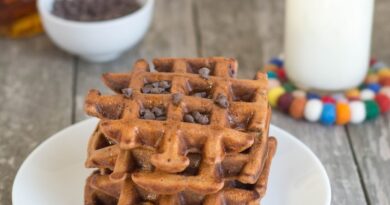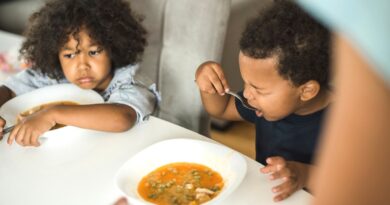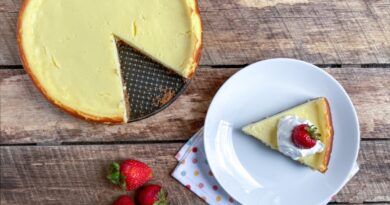How to choose the best yoghurt for babies and toddlers with nutrition in mind
Yoghurt is one of my favourite first foods for your little one to explore but as a paediatric dietitian I have concerns about some of them.
Believe it or not, not all of the baby yoghurts you can buy are actually good for your little one, read on to discover the best baby yoghurts and the ones to avoid!

Why is yoghurt good for babies and toddlers?
Yoghurt is a nutrient-rich food that can support your baby’s growth and development.
It’s a great source of protein, which is essential for building muscles and tissues. It also contains calcium for strong bones and teeth, and probiotics, or “live active cultures,” which can help promote a healthy gut.
Plus, the creamy smooth texture of yoghurt is perfect for babies who are just starting to explore foods.
It’s a bit messy, but encourage your little one to get stuck in, embracing the mess is all part of the fun of self-feeding!

When can a baby have yoghurt?
Most babies can start having yoghurt as soon as they begin eating solid foods, so around 6 months old.
It’s a good idea to start with plain whole milk yoghurt, as it’s high in beneficial fats that babies need for brain development.
For more information on introducing solids, check out our guide on The best first foods for baby led weaning.
Is yoghurt a choking hazard?
No, natural whole milk yoghurt is generally considered a safe food for babies and toddlers. It’s smooth texture makes it easy to swallow, even for babies who are just starting on solids.
However, yoghurt with lumps of fruit or cereals added, could pose a choking risk to young babies who are not yet competent eaters.
Mixed textures like lumps in a sauce are actually one of the most complex types of food textures for babies to manage.
As always, supervise your little one while they’re eating to ensure they’re safe.
Is yoghurt an allergen?
Yes, yoghurt is an allergen. Most yoghurts are made from cow’s milk, which is the most common food allergy in babies!
If your little one has had formula milk and they haven’t reacted to it, you don’t need to worry about introducing yoghurt because formula contains cows milk too, so they’ve already been exposed to it.
If your little one has been exclusively breastfed, foods containing cow’s milk like yoghurt will be a new allergen and so it’s important to introduce the yoghurt on a day when you’re not offering any other new allergens.
Other yoghurts can be allergens too such as goats, sheep, soya or nut based yoghurts.
If you are concerned about introducing allergens to your little one, do seek professional advice. You can check out my ‘Introducing Allergens’ mini course here.

What you should look for on the food label when choosing a yoghurt
Not all yoghurts that are aimed at babies are actually suitable. I have my reservations about some of them!
When you are looking at the packaging here’s what to look out for on the ingredients list and also the nutritional information panel.
Ingredients
Look for yoghurts that list “whole milk” as the first ingredient, this is your indication that you’re getting a good quality product.
Whole milk yoghurt is higher in beneficial fats and certain vitamins than low-fat or fat-free options.
Also, check for live active cultures or ‘probiotics’, which are beneficial bacteria that can support your baby’s gut health and immune system.
Be wary of sugars that have been added, sometimes these are not obvious and can be called sucrose, glucose syrup, dextrose, fructose, or even fruit juice concentrate.
Babies under 2 years of age don’t need any added sugars in their diet.
Instead, opt for plain yoghurt which is naturally sweet, and if they really won’t eat it unless it’s flavoured add your own! See my suggestions below for nutritious yoghurt toppers.
Nutrition labelling
Here’s how to use the nutrition information on the food label to make an informed choice.
Fat can be surprisingly high in yoghurts!
For your baby fat is an important source of calories needed for growth so always choose a full fat version rather than low fat.
Some yoghurts have extra cream added to make them more luxurious but these will be higher in saturated fats and not the healthy fats that are beneficial for your baby.
Whole milk yoghurt should contain 5g fat per 100g of yoghurt. Check the nutritional information panel to make sure your yoghurt is not more or less than this.
Sugars are naturally found in milk, you may have heard of them, they’re called ‘lactose’ and you don’t need to worry about this type of sugar in your baby’s diet.
All cows milk based yoghurt will have around 5g sugar per 100g.
However I say ‘around’ because this can depend on how it’s been made. Thicker yoghurts such as Greek yoghurt or Skyr will have less.
Don’t be alarmed if you look at the nutrition information panel and see that there is a number by the ‘of which sugars’ it may well be that this is just the natural sugar.
Instead check the ingredients list for those sources of added or hidden sugars. They’re the ones to avoid.
Protein is also naturally present in yoghurt and most babies get more than enough in their diet from breast milk, formula and other foods.
Whole milk natural yoghurt contains 4g protein per 100g.
Greek yoghurt contains a bit more, 5g to 9g per 100g and Skyr even more again at 10g per 100g.
If your baby is following a milk free or plant based diet you do need to pay a little more attention to how much protein they’re getting as by default they’ll eat less.
Soya yoghurts contain more protein (4g/100g) than oat based yoghurt (1.5g/100g).
Don’t choose a yoghurt with added protein as these are highly processed foods aimed at adults and are not suitable for young babies with developing digestive systems.
Calcium will always be found in a milk based yoghurt as it’s naturally present in cows milk. This often isn’t reported on the food label but in 100g of yoghurt expect to find 135mg calcium.
If you are looking for a milk-free option, check that it has had calcium added so your little one is not missing out on this important nutrient for bone health. Look for 120mg/100g.

Is raw milk yoghurt suitable for babies?
No, absolutely not. Avoid yoghurts made from raw milk.
Despite people believing that raw milk is healthier, this is not suitable for babies and young children.
Raw milk products often contain harmful bacteria such as salmonella, campylobacter and listeria which can make your baby severely unwell.
Fortunately these bacteria are killed during the pasteurisation process that turns raw milk into the standard milk and yoghurt we can buy in shops.
Is Greek yoghurt suitable for babies?
Yes absolutely. In fact the thicker consistency of Greek yoghurt compared to plain yoghurt will make it easier for your little one to keep on the spoon as they are practising feeding themself.
What’s the difference between Greek yoghurt and Greek style yoghurt?
Greek yoghurt is strained to remove the liquid whey, resulting in a thicker, creamier yoghurt with more protein.
Greek style yoghurt, on the other hand, often has not been strained and typically it is made thicker with the addition of starches, gums or gelatine.

Is Skyr suitable for babies?
Yes it is!
It is higher in protein and some people advise that babies might find this more difficult to digest, but believe it or not, baby’s bodies are quite capable of digesting protein!!
One thing to note however is that it’s not easy to find whole milk Skyr yoghurt. I buy mine from Waitrose but many of the other British supermarkets only stock the low fat or fat free versions so just double check your Skyr contains 5% fat.
What’s the difference between Greek yoghurt and Skyr?
It’s just down to the way they are made.
Greek yoghurt is strained to remove the liquid and make it thicker.
Skyr has Icelandic cultures added and then it is reduced down to make it thicker. There are 4 cups of milk that go into making 1 cup of Skyr which is why it is much more nutrient rich and has a creamier texture.
How much yoghurt should you serve?
For babies and toddlers, a serving of yoghurt is typically around 2-3 tablespoons.
Remember, it’s always best to start with small amounts and increase as your baby grows and develops. For more tips on portion sizes, check out our guides on Baby Portion Sizes for each age and stage.

Can I give my baby goat or sheep yoghurt?
Yoghurt made from goat’s milk or sheep’s milk can be included in a baby’s diet as long as they’re made from pasteurised milk. In some parts of the world these are the more popular choice!
If your little one has a cow’s milk protein allergy, milks from other animals aren’t recommended as the proteins are very similar and can still cause a reaction.

My baby won’t drink formula or milk, can I replace it with yoghurt?
While yoghurt is a nutritious food, it shouldn’t replace breastmilk or formula in your baby’s diet. These are still the primary sources of nutrition for babies under 12 months.
However, yoghurt can be a great addition to your baby’s diet once they start eating solids.
If your baby is over 1 and is a milk refuser, yoghurt can be a really helpful food to make up the nutrition. Offering a 125g serving of yoghurt (often a standard pot size) is equal to 200 ml cow’s milk.

Can babies have too much yoghurt?
Potentially yes.
Babies often love yoghurt as it’s naturally sweet and they have a preference for sweet foods.
It’s also very easy to swallow meaning that it requires very little hard work and therefore yoghurt can quickly become a favourite food.
Babies need to experiment with new flavours and textures of a variety of different foods to get balanced nutrition. But it’s also to learn about food and prevent fussy eating or a strong preference for just a few.
But in addition too much calcium (which yoghurts contain a lot of) can inhibit the absorption of iron, a critical nutrient that babies need quite a lot of in the first few years of life.

Is it ok for toddlers to eat yoghurt every day?
Yes it is but keep to the suggested portion size of 2-3 tbsp of 100-125g once a day.

Is yoghurt good for babies at night to help them sleep?
Yoghurt contains the amino acid tryptophan and this is linked to the sleepy hormone melatonin.
However there isn’t enough evidence to suggest eating yoghurt (or even drinking milk) before bed improves sleep, so the jury is out!

Is yoghurt good for babies with diarrhoea?
If you buy a yoghurt that contains live active cultures or ‘probiotics’ research has shown that these can shorten the duration of diarrhoea caused by tummy bugs or as a side effect of taking antibiotics.
Yoghurt also contains fluid which your baby will need more of to prevent dehydration if they have diarrhoea.

Is yoghurt good for babies with constipation?
Again it’s down to those probiotics or live active cultures. Research suggests that some cultures can help relieve constipation if ingested regularly.

Is yoghurt good for babies with a cold or a fever?
There is no special ingredient that makes a cold go away or a temperature go down, but when your baby feels unwell they are likely to lose their appetite and not want to eat.
As yoghurt is so nutritious, it’s often considered a good wholesome food to encourage them to eat when they’re not feeling well.

What are the best yoghurts for babies and toddlers?
Believe it or not, bog standard whole natural yoghurt that is aimed at adults is exactly the same as whole whole natural yoghurt that’s aimed at babies and children.
Adult yoghurts often have additions such as fruits, sugars, sweeteners etc or have the fat removed to make it ‘diet or low fat yoghurt.
So with all of that said, let me give you my recommendations.
Here are my top 5 best yoghurts for babies:
- Fage 5% Natural Yoghurt
- Onken Natural Yoghurt
- Yeo Valley Organic Natural Yoghurt
- Lancashire Farm Natural Bio Yoghurt
- Skyr 5% Natural Yoghurt
As a rule of thumb, look for plain, whole milk yoghurts with no added sugars.

Are here are my top 5 yoghurts to avoid for babies and toddlers:
These contain added ingredients little ones just don’t need:
- Marvel Kitchen Avengers Yoghurt Pouches
- Munch Bunch Double Up
- Frubes Yoghurt Tubes
- Wildlife Yoghurt Choobs
- Peppa Pig Fromage Frais

What if my baby or toddler will only eat the fruit flavoured yoghurts?
If your baby or toddler prefers shop bought fruit-flavoured yoghurts, you can try gradually transitioning them to plain yoghurt by mixing the two together.
However this may not be easy because of their innate preference for sweet foods and they’ve learned what they like!
Therefore a compromise may be thinking about what to mix with yogurt for babies such as adding your own fruit purees to natural whole milk yoghurt as a more nutritious alternative.
Here are my ‘halfway happy’ flavoured yoghurt recommendations:
If your baby won’t take natural yoghurt (and you don’t have the time or energy to create your own fruit purees to add), here are my halfway happy recommendations:
- Petits Filous
- The Collective Suckies
- Little Yeo’s
- Piccolo Organic Squeezy Yoghurt
Decant anything that comes in a pouch into a bowl before serving to your baby because if your baby can’t see their food they’ll struggle to learn about it, which is strongly linked to fussy eating in the toddler years.

What are the best yoghurts if your baby has a milk allergy, is vegan or plant-based?
Look for dairy-free yoghurt options made from a plant milk such as soya milk, almond milk, oat milk or coconut milk.
Just be sure to check the ingredients and nutrition label, as some dairy-free yoghurts can be high in added sugars.
You also want to make sure that the plant based yoghurts have enough protein, added calcium and iodine (if possible).
Be aware that plant based yoghurts are not as nutritious as dairy based ones as they naturally contain less fat, protein, vitamins and minerals, so work with a Registered Dietitian to devise a tailor made eating plan to ensure your little one gets the best start in life.
Here are my dairy-free yoghurt recommendations:
- Oatly Greek Style Oatgurt
- Alpro Greek Style Plain
- Tesco Plant Chef Soya Alternative to Greek Yoghurt
- Oatly Plain Oatgurt
- Koko Dairy Free Original Plain Yoghurt

When is it okay to introduce shop bought flavoured yoghurts?
Shop bought flavoured yoghurts can be high in added sugars, so it’s best to wait until your baby is over 2 before introducing these.
When you do introduce them, opt for yoghurts with no added sugars and natural flavours.

How to store unfinished pots of yoghurt safely?
Always be sure to check the use-by date to ensure the yoghurt is fresh as it does have a short shelf life.
If you have a big pot of yoghurt and have spooned some into a bowl for your baby, you can store the remaining pot in the fridge, covered for up to 3 days.
If your baby has dipped their hands or a spoon into the yoghurt, you can’t save leftovers for later. Unfortunately, exposure to natural bacteria will make it turn bad quickly.
If you are unable to finish a pot of yoghurt before the end of 3 days try these ideas:
- Add it to a smoothie instead of milk like our watermelon banana smoothie
- using it as a base for a dip like this Jamie Oliver mint dip recipe.
- Mix with fruit for a quick and healthy dessert like these fruit on the bottom pots.
- Make Baby Yoghurt Melts
- 2 Ingredient Pizza Dough
- Yoghurt pancakes
- Or if you have a bit more time, these no cook strawberry cheesecakes are yummy.

Nutritious yoghurt toppers for babies and toddlers
Adding toppers can make natural yoghurt more interesting to your little one and also add extra nutrients to their meal.
Automatically people think of sweet foods as yoghurt toppers but natural yoghurt is such a versatile food it’s great as a savoury option too.
Try topping with:
- Fruit puree – here’s my recipe for a mango puree
- A sprinkle of ground nuts or seeds like chia, hemp, pumpkin, sunflower or flax.
- Desiccated coconut.
- Smooth nut butters that are well mixed into the yoghurt (lumps of peanut butter can be a choking risk)
- Grate cucumber into natural yoghurt to make a dip.
- A sprinkle of cinnamon
- Chia seed jam
- Baked apple with raisins, pureed if they’re young
- For a savoury treat try adding pureed sweet potato or butternut squash
- And for a protein boost add purees black beans, chickpeas or lentils.
Need more advice when it comes to feeding your baby? Read more in my blog on stage 2 weaning.

Sarah Almond Bushell MPhil, BSc (Hons) RD MBDA – Registered Dietitian & Children’s Nutritionist
The post How to choose the best yoghurt for babies and toddlers with nutrition in mind appeared first on The Children's Nutritionist.




